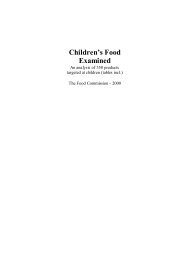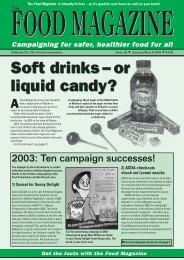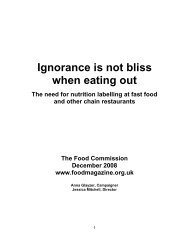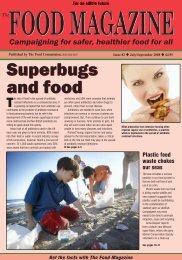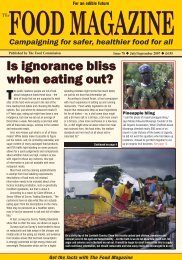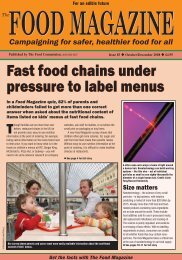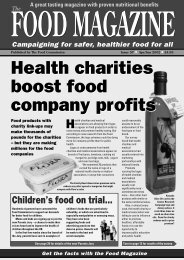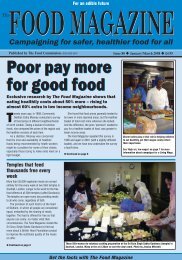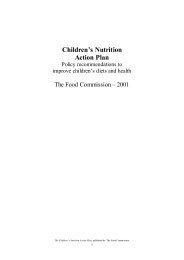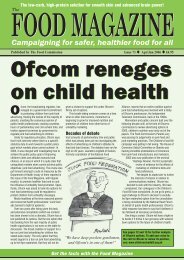Food Magazine - The Food Commission
Food Magazine - The Food Commission
Food Magazine - The Food Commission
You also want an ePaper? Increase the reach of your titles
YUMPU automatically turns print PDFs into web optimized ePapers that Google loves.
environment<br />
re a call to action!<br />
<strong>The</strong> Marine Stewardship Council logo is one of the few ways consumers<br />
can identify sea fish that come from verified sustainable sources<br />
engage forest-dwellers and fishing communities<br />
in the process of conservation, especially by<br />
offering them reliable incomes and preferential<br />
fishing and farming rights based on conservation<br />
management plans, then they themselves will be<br />
partners in the defence of natural resources on<br />
which their livelihoods depend. But trust must be<br />
built: communities must understand the value of<br />
the natural resources they rely on, and receive<br />
commensurate reward for protecting them on all<br />
our behalves. Oceans may then remain rich and<br />
permanent sources of human food.<br />
Three mainstream<br />
UK supermarkets are<br />
so far credited as<br />
leading the way on<br />
providing fish from<br />
more sustainable and<br />
certified supplies.<br />
Marks & Spencer,<br />
Waitrose and<br />
Sainsbury's are widely<br />
recognised as taking a<br />
pro-active approach to<br />
sustainable fisheries,<br />
setting the pace in a<br />
competitive sector.<br />
Waitrose, for example,<br />
sources Icelandic fish,<br />
where bottom-trawling<br />
is banned. As leading US oceanographer Sylvia<br />
Earle explains, 'Trawling is like bulldozing a<br />
forest to catch songbirds' – it is an industrialised<br />
fishing technique that cuts gargantuan swathes<br />
through underwater landscapes, with nets big<br />
enough to contain several jumbo jets. If<br />
ecosystem destruction at this scale were visible<br />
above the waves, it would be an international<br />
scandal. M&S therefore favours less intensive<br />
line-caught cod. Meanwhile, Sainsbury's is the<br />
only supermarket to have set a goal of 100 per<br />
cent MSC-certified fish, by 2010.<br />
However, where does this leave the other<br />
supermarkets Is it enough simply to accept<br />
ethical fish-buying standards from just a few<br />
retailers whilst others continue to encourage the<br />
rest of us to eat our way through dwindling fish<br />
stocks What good will that be to future<br />
generations<br />
<strong>The</strong> way forward for palm-oil production is<br />
less clear. Supermarkets have only just begun to<br />
wake up to the ramifications of removing this<br />
ingredient from so many products, or of<br />
replacing it with a sustainable alternative.<br />
Environmental organisations such as the<br />
WorldWide Fund for Nature (WWF) and Friends<br />
of the Earth urge companies to engage with the<br />
international Roundtable on Sustainable Palm Oil<br />
– a meeting place for all those concerned about<br />
wildlife, livelihoods of people in poor countries,<br />
and the manufacture of food and other products.<br />
Supermarkets need to set targets for phasing<br />
out unsustainable palm oil, communicate this to<br />
their suppliers, and invest in alternative sources.<br />
<strong>The</strong>y cannot wait for consumers to wake up to<br />
the destruction of whole ecosystems.<br />
<strong>The</strong> new environmental reports referred to in<br />
this feature are: Fishing for good<br />
(www.forumforthefuture.org.uk); Like shooting<br />
fish in a barrel (www.sustainweb.org)and <strong>The</strong><br />
oil for apes scandal (www.foe.co.uk).<br />
Sainsbury’s offers to triple your food miles!<br />
As our food system becomes ever more global,<br />
the products we consume represent the use of<br />
more and more transport fuel. <strong>The</strong> food system<br />
has been identified as a major contribution to<br />
carbon dioxide emissions and global warming.<br />
<strong>The</strong>re are plenty of examples of the lunacy of<br />
increasing food miles, such as apples brought all<br />
the way from New Zealand during our own apple<br />
season, whilst orchards in the UK are routinely<br />
grubbed up as 'uneconomic' – a waste of both<br />
fuel and good apple trees.<br />
<strong>The</strong> globalised food system has meant that we<br />
look further and further afield for our gastronomic<br />
experiences. Wine is a good example. Although<br />
lots of fine wine can be bought from Europe, the<br />
UK has become by far the biggest export market<br />
for Australian wine. Australian exports of wine to<br />
the UK have gone up nearly threefold in the past<br />
10 years, to over £400 million per year, according<br />
to figures published in September by the<br />
Australian Wine & Brandy Corporation.<br />
We don't have to stop drinking wine altogether to<br />
cut our personal contribution to global warming, but<br />
we could make sure that most of the wine we drink<br />
comes from closer to home. European producers<br />
have many admirable wines. Supermarkets, who<br />
are well aware of the link between food choices and<br />
carbon dioxide emissions, could help us to choose<br />
less carbon-intensive products. <strong>The</strong>y could make a<br />
commitment to putting special offers only on<br />
products grown and packed within a reasonable<br />
distance, and to discourage use of aeroplanes for<br />
food and passengers.<br />
In light of this, what do we find in Sainsbury's<br />
Shelf after shelf of Australian wine – but also a<br />
special promotion. Collect Nectar Points on<br />
Australian wine, then set off on a return flight to<br />
Australia to see where the wine was grown –<br />
effectively tripling your food miles!



